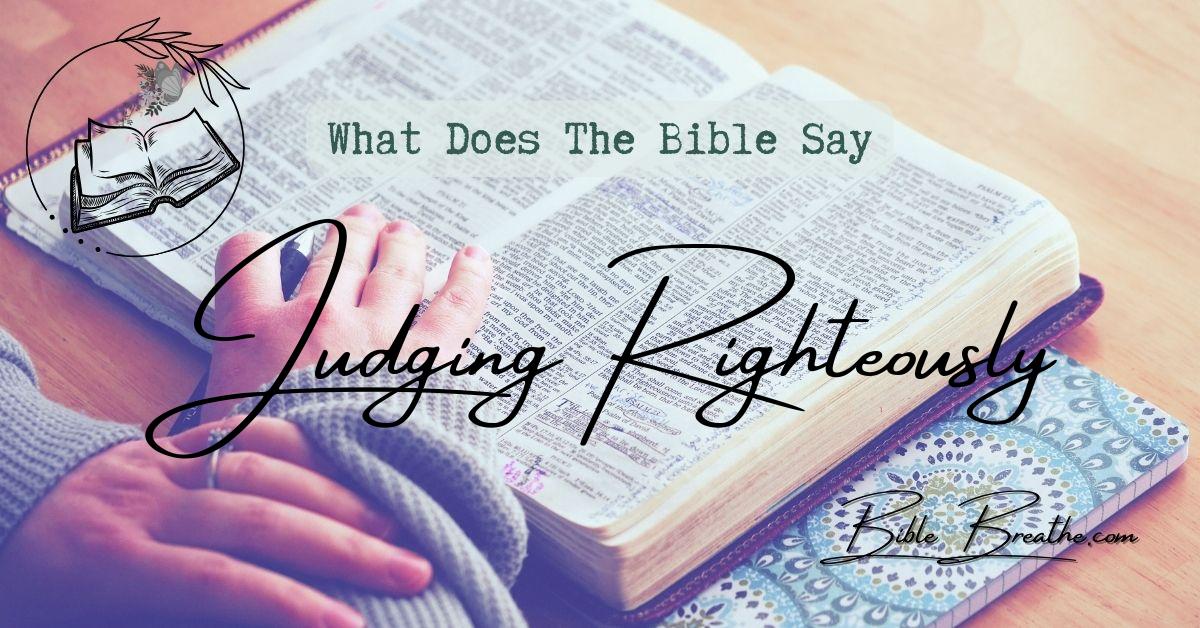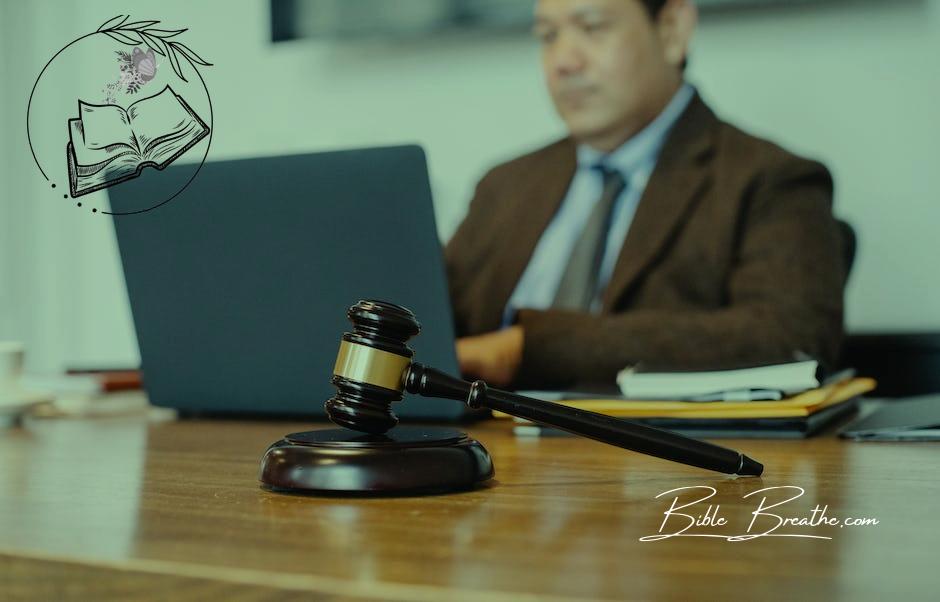Ever wondered what the Good Book has to say about judging righteously?
Well, let’s dive into this deep well of wisdom.
Picture this: You’re in a fruit market, sorting the good apples from the bad.
That’s what righteous judgment is about—separating right from wrong with the light of God’s truth.
But beware, there’s a counterfeit: hypocritical judgment.
It’s like calling out a speck in your buddy’s eye while ignoring the log in your own.
So, how do we get this right?
Get ready to explore the Scriptures like an adventure, uncovering the keys to moral judgment, spiritual discernment, and God’s perspective.
It’s a bit like GPS for your soul.
We’ll cover ethics, morality, and understanding the hearts of others.
Remember, it’s not about avoiding judgment but learning to judge righteously, just as Jesus taught us.
Together, we’ll journey toward a more compassionate and understanding world.
🌟
“Judge not according to the appearance, but judge righteous judgment.” – John 7:24 (KJV)
Key Takeaways
- Understanding the Bible’s teachings about judging righteously is essential for believers. It emphasizes the importance of discernment and making fair judgments based on God’s standards.
- The Bible warns against the dangers of judgment without self-reflection and understanding. Hasty or hypocritical judgments can lead to division and harm within the community.
- Believers are called to practice righteous judgment with love and compassion. Jesus himself urged followers to remove the plank from their own eye before addressing the speck in their brother’s eye, highlighting the need for humility and self-awareness.
- Righteous judgment is not about condemning others but about helping them grow in faith and righteousness. It involves addressing issues with the goal of restoration and reconciliation rather than condemnation.
- Ultimately, what the Bible says about judging righteously underscores the importance of balanced and thoughtful discernment within the Christian community. It encourages believers to approach judgment with a heart full of love, understanding, and a commitment to righteousness, fostering a community that supports growth and spiritual maturity.
Discernment Unveiled: Understanding Righteous Judgment
Photo modified by BibleBreathe.com. Original photo by Sora Shimazaki on Pexels
In the vast landscape of biblical wisdom, we stumble upon a phrase that has stirred many conversations.
As the good book puts it: > “Judge not, that you be not judged.” – Matthew 7:1 (KJV).
Oh, it’s like unearthing buried treasure—let’s dig deeper into this enigmatic saying.
Peeling Back the Layers
Ever been to a pizza joint and faced a pizza with toppings you’d never even think of?
You could dismiss it outright, saying, “Nah, not my style,” or you could take a slice and then form your opinion.
Matthew 7:1 is a bit like that pizza situation.
It’s not a blanket statement against evaluating or discerning; it’s more like a caution against hasty judgments.
Imagine it as a mirror reflecting our imperfections, those tiny specks of dust in our eyes.
Quick judgments are like trying to clear that speck from someone else’s eye while a giant log resides in our own.
Essentially, it nudges us to reflect on our own imperfections before pointing fingers at others.
The Wisdom of Righteous Judgment
Now, let’s sprinkle some divine wisdom about righteous judgment into our mix.
When we talk about judging rightly, we’re not throwing stones or passing severe sentences like a stern judge in a courtroom drama.
No, we’re seeking to perceive things through the lens of moral standards, ethics, and spiritual discernment.
Imagine it’s like being an umpire in a game—not favoring one team but making calls based on the rules.
Likewise, righteous judgment involves evaluating situations with God’s perspective and biblical principles in mind.
It’s about discerning what aligns with the goodness and morality defined by these principles.
Finding the Equilibrium
Now, here’s the twist.
It’s a slippery slope, easily veering towards extremes—condemning everything or turning a blind eye to wrongdoings.
The Bible nudges us towards a tightrope walk, a harmonious balance.
It urges us to exercise moral judgment and spiritual maturity while also extending grace and compassion.
So, next time you encounter that famous phrase, remind yourself: it’s an invitation to judge with fairness, understanding, and a heart that seeks righteousness.
Because, in the grand story of life, isn’t it better to be recognized as a discerning sage than a rash critic?
That neatly wraps up our journey through Matthew 7:1 and the delicate art of righteous judgment.
May your judgments be threads of wisdom woven with the fabric of compassion in the vast tapestry of life.
Nailing Righteous Judgment
Ever heard the phrase, “Don’t judge a song by the first note”?
The Bible sings a similar tune, but it’s about judging with a deeper melody.
Let’s tune in and explore what the Good Book has to say about judging righteously.
John 7:24 – “Don’t judge by what you see with your eyes; instead, judge with right judgment.” – John 7:24 (KJV)
This powerful verse from the Gospel of John is like putting on spiritual glasses that give you a clear vision beyond the surface.
Imagine strolling through a farmer’s market, eyeing a seemingly perfect peach – plump and flawless.
But, as you take a bite, you realize it’s overripe and mushy inside.
Superficial judgments can be just like that – they might seem appealing at first, but they lack substance within.
So, what’s the takeaway?
It’s about seeing beyond the surface, beyond the facade or the initial impression, and diving into the heart of the matter.
It’s about evaluating actions, intentions, and character with a discerning eye, not a critical one.
The Pitfalls of Judging Based on Appearances
Picture this: You encounter someone in worn-out clothes, and your instinct is to brush them off as destitute or insignificant.
But what if that person holds wisdom beyond measure or a heart brimming with kindness?
You’d miss out on a meaningful connection, all due to a hasty and judgmental call.
The Bible rings a clear alarm against hypocritical judgment.
It’s like holding a magnifying glass over others’ faults while overlooking our own.
This kind of judgment not only damages our relationships but also contradicts the very love and compassion the Bible preaches.
So, how do we judge righteously?
It kicks off with realizing the value of humility, empathy, and spiritual insight.
It’s about seeking God’s perspective, syncing with moral principles, and growing spiritually.
Righteous judgment isn’t about throwing stones; it’s about careful assessment, understanding, and examination guided by a conscience rooted in love and empathy.
In a world brimming with moral mazes and ethical puzzles, mastering the art of righteous judgment is like having a compass that navigates us through life’s challenging terrain.
So, the next time you’re tempted to make a quick judgment, recall the wisdom of John 7:24 and ponder, “Am I judging with right judgment?”
In the end, it’s not about the exterior, but the melody that resonates from the depths of the heart.
Mirror of Righteous Judgment: Embracing Self-Reflection
Photo modified by BibleBreathe.com. Original photo by Julia M Cameron on Pexels
In the vast realm of judging righteously, Matthew 7:1-5 holds a profound lesson, akin to a hidden gem waiting to be unearthed.
This passage serves as a mirror, reflecting the vital need for self-awareness before donning the hat of a judge.
Specks and Logs: An Unusual Contrast
Imagine this whimsical scenario: aiding a friend with a tiny speck of dust in their eye while lugging around a colossal log in your own.
Quite a comical picture, isn’t it?
Yet, that’s the crux of Matthew 7:1-5.
It’s an invitation to introspect before hastily correcting others.
Picture being in a pottery class, observing a slight crack in your friend’s vase.
Would you highlight their flaw while disregarding the shattered pieces of your own vase?
Likely not.
Similarly, before critiquing another’s imperfections, it’s crucial to acknowledge and address our own.
Illuminating Power of Self-Awareness
Envision self-awareness as a tool—a magnifying glass revealing intricate details.
It’s akin to looking in a mirror, not for vanity, but to scrutinize your character.
Self-awareness empowers you to discern your biases, prejudices, and imperfections.
In the realm of righteous judgment, self-awareness acts as a guiding compass, directing you towards fairness.
It prompts crucial questions like, “Am I being fair?
Am I applying the same standards to myself as I am to others?”
This helps steer clear of the trap of hypocritical judgment.
A Humble Seasoning: Embracing Humility
Now, let’s sprinkle in a touch of humility.
Humility is like the seasoning that enriches the taste of a dish.
It’s the acknowledgement that none of us are flawless; we all stand in need of grace.
Even in the Bible, Jesus, the epitome of righteousness, exemplified humility.
He didn’t come to condemn but to offer redemption.
So, when we engage in righteous judgment, it’s with a heart inclined towards restoration and growth, not condemnation.
To conclude, the role of self-reflection in judgment serves as the foundation of a sturdy edifice.
It ensures that our judgments stand firm on the grounds of fairness, self-awareness, and humility.
As you navigate the art of judging righteously, remember to check your own heart and actions first.
After all, it’s through our personal growth that we become better aids to others in their journey.
The Noble Art of Righteous Judgment
Photo modified by BibleBreathe.com. Original photo by Sora Shimazaki on Pexels
In the grand mural of life, judgment paints a significant stroke.
But the Bible isn’t merely advocating for judgment for judgment’s sake; it’s calling for a righteous and purposeful brushstroke.
Proverbs 31:9 – “Speak up and judge fairly; defend the rights of the poor and needy.” – Proverbs 31:9 (KJV)
Picture this: You’re stationed at the gates of a bustling city, and your role is that of a vigilant sentinel.
The city mirrors society, and your duty isn’t just to judge but to judge righteously.
Proverbs 31:9 echoes this sentiment – it’s a call to action, an urging to open your mouth and speak up for what’s just.
But what’s the canvas of righteous judgment here?
It’s not about passing judgments on others’ life portraits but about being a champion for the oppressed and overlooked.
Think of it as being an unwavering advocate for those without a voice, a modern-day hero for the downtrodden.
When you judge righteously, you become a beacon of hope in a world often clouded in shadows.
It’s like being a lighthouse on a tempestuous night, guiding ships safely to harbor.
You provide clarity amid the chaos, speaking out for those whose voices have been hushed by injustice.
But why shoulder this responsibility?
The Bible’s message is crystal – it’s a moral duty.
It’s akin to being entrusted with a treasure chest of compassion and empathy, and your mission is to share it with those in desperate need.
It’s a divine calling to uphold moral values, protect the defenseless, and stand tall against oppression.
In a world brimming with moral conundrums and ethical puzzles, the call to judge righteously is akin to a compass pointing you toward your true north – a path of righteousness and justice.
It’s not about casting stones but about radiating love, embodying goodness, and epitomizing the biblical ideals of compassion and mercy.
So, the next time you hear the clarion call to “judge righteously,” remember Proverbs 31:9, and let it resonate as a reminder of your noble artistry to defend the rights of the poor and needy.
In doing so, you wield the brush of divine justice in a world yearning for compassion and equity.
Illuminating Righteous Judgment: A Spiritual Insight
Photo modified by BibleBreathe.com. Original photo by Sora Shimazaki on Pexels
As we venture into the art of judging righteously, let’s take a closer look at a verse from 1 Corinthians 2:15 that shines a light on the spiritual dimension of judgment: > “The spiritual person judges all things, but is himself to be judged by no one.” – 1 Corinthians 2:15 (KJV).
Decrypting the Verse: A Spiritual Detective’s Tale
Picture yourself as a seasoned detective, well-versed in solving mysteries.
Your eye keen, able to discern truth amidst a web of lies.
In a similar vein, this verse implies that a spiritually mature person possesses the ability to judge and discern all things.
Here’s the twist: while they possess this capacity to judge, they stand beyond the reach of judgment from others.
It’s akin to a master chef critiquing any dish but being impervious to criticism about their own cooking.
The Radiance of Spiritual Maturity: A Lighthouse in Darkness
Imagine a dimly lit room where right and wrong blur into obscurity.
Now, envision someone switching on a potent flashlight, illuminating every detail and nuance.
That flashlight mirrors spiritual maturity, profoundly influencing how we judge.
Spiritual maturity isn’t about an air of holiness; it’s about a deep grasp of God’s perspective and biblical standards.
It’s like ascending to a higher vantage point, where you can perceive the grand tapestry of life.
When spiritually mature individuals judge, they do so with a heart imbued with compassion, aiming to align with God’s wisdom.
They understand that their judgments should resonate with the principles of righteousness, ethics, and morality found in the Bible.
The Aegis of Spiritual Discernment: A Shield of Love
Now, envision spiritual discernment as a sturdy shield.
It fortifies against the pitfalls of hypocritical judgment and harsh condemnation.
It’s like having a filter that sieves through motives and intentions, enabling judgments rooted in love and understanding.
In the vast tapestry of life, this verse from 1 Corinthians reminds us that, as we mature spiritually, our ability to judge righteously deepens.
We become akin to skilled artists discerning the subtlest hues in a painting.
And as we wield this gift of judgment, let us do so with the awareness that our hearts are under the loving guidance of the Divine, beyond the judgments of mere mortals.
The Heavy Load of Unrighteous Judgment
Photo modified by BibleBreathe.com. Original photo by Sora Shimazaki on Pexels
Ever heard the saying, “You reap what you sow”?
The Bible has a variation of this idea, particularly when it comes to judgment, especially if it’s unrighteous.
Romans 2:1-3 – “You, therefore, have no excuse when you judge someone else. You condemn yourself, for you who judge others do these very same things.” – Romans 2:1-3 (KJV)
Imagine a courtroom where you’re not just the judge, but you’re also on trial for the very offenses you’re passing judgment upon.
Picture being in the defendant’s seat while draped in the judge’s robe.
Romans 2:1-3 paints a clear picture of the danger of unrighteous judgment – it’s a boomerang that can swing back your way.
But why is this so weighty?
Think of it like this: You’re critiquing someone for their moral choices, pointing out their flaws and shortcomings, all the while ignoring your own imperfections.
It’s like being an art critic who can’t paint or a food critic who can’t cook.
This kind of judgment not only lacks credibility but also invites God’s scrutiny.
In the grand scheme, unrighteous judgment is like sowing seeds of condemnation.
It’s as if you’re throwing stones while standing on fragile glass.
It fractures relationships, erodes trust, and undermines the moral standards you claim to uphold.
It’s a stark display of hypocrisy, echoing Romans 2:1-3.
So, what’s the fallout in God’s eyes?
Imagine a mirror reflecting your actions and intentions, but it magnifies them, making your own faults more glaring.
Unrighteous judgment is like tarnishing that mirror, distorting your self-awareness and blocking the path to spiritual growth.
It’s akin to shutting the door to God’s perspective and righteousness.
In a world where ethical lines blur and moral judgments can be obscured, grasping the consequences of unrighteous judgment is like navigating through treacherous waters.
It’s a reminder to tread carefully, to be aware of our own imperfections before critiquing others, and to seek spiritual insight grounded in humility and self-awareness.
So, the next time you feel the urge to pass judgment, recall Romans 2:1-3, and ponder, “Am I ready to face the repercussions of my own judgment?”
Ultimately, it’s not about pointing fingers, but about reaching for righteousness with a heart overflowing with grace and understanding.
Frequently Asked Questions (FAQs) About What Does The Bible Say About Judging Righteously
What does the Bible say about judging others?
The Bible warns against hypocritical and unrighteous judgment (Matthew 7:1-5).
It encourages us to exercise discernment but not to condemn others harshly.
How can we judge righteously according to the Bible?
The Bible advises us to judge with fairness and compassion.
In Matthew 7:1-5, Jesus teaches that we should remove the ‘log’ from our eye before helping our brother with the ‘speck’ in theirs.
Righteous judgment is marked by humility and a desire to guide others towards righteousness.
Why is it important to avoid hypocritical judgment?
Hypocritical judgment contradicts the core of Christian values.
The Bible warns against judgment rooted in hypocrisy, emphasizing self-reflection before criticizing others.
Hypocritical judgment disrupts unity, damages credibility, and neglects the mercy and grace God bestows on all.
By avoiding hypocritical judgment, believers embrace humility, understanding, and the ability to offer constructive, non-condemning guidance while exemplifying genuine love and compassion.






